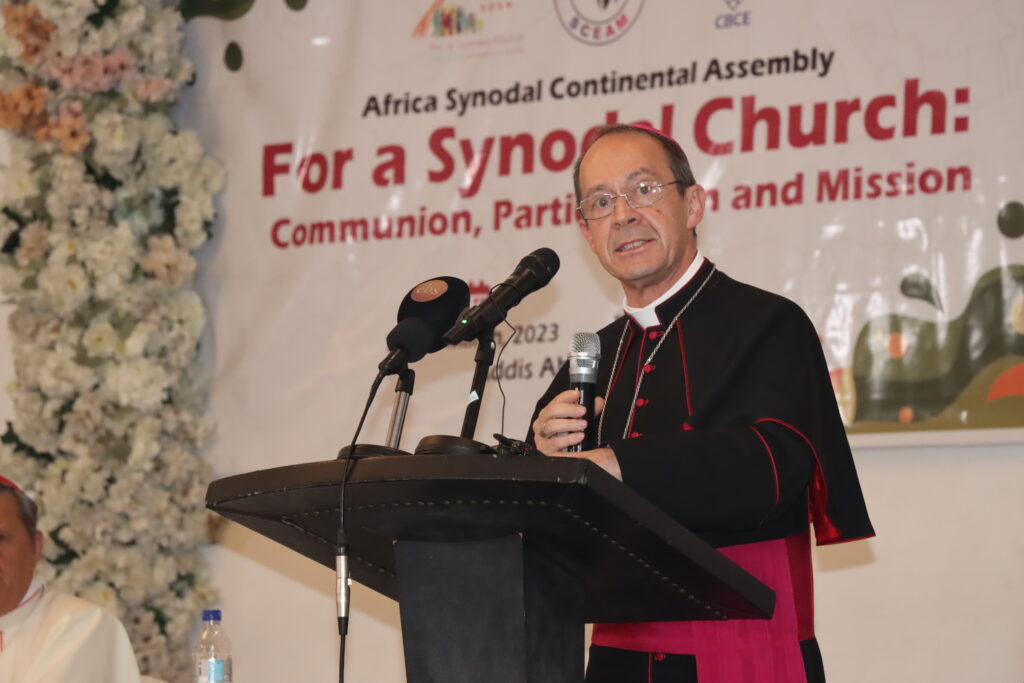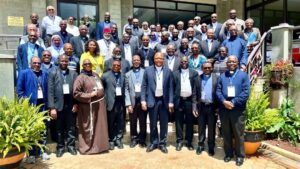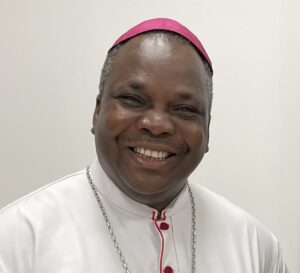SYNOD- SECAM: Synodality Calls for Carrying out Daily Activities with a Renewed Evangelical Spirit: Nuncio in Ethiopia

Apostolic Nuncio in Ethiopia and Djibouti Archbishop Antoine Camilleri. Credit; AMECEA Online
Sr. Jecinter Antoinette Okoth, FSSA
Delegates from across all African countries and beyond attending the continental synod meeting in Ethiopia, have been reminded that synodality is not a new concept in the Church but a call in the current synodal process to have a renewed evangelical spirit in their ministries.
“Synodality, though, is not a new structure or another set of formalities that must be adopted or applied: rather than being a question of what else or what more to do,” His excellency Archbishop Antoine Camilleri the Apostolic Nuncio in Ethiopia said, “It is a matter of doing the things we have been doing and carrying out daily with a renewed evangelical spirit.”
“Synodality is meant to permeate structures, inspire events and inform processes. And it is “intended to inspire people to dream about the Church we are called to be,” The Pope’s representative said referencing the Vademecum (guide) for the Synod on Synodality, and adding that “Synod is what we must learn to be and the mission being entrusted to us.
Focusing on the aspect of togetherness, the Maltese Prelate who doubles as the Nuncio for Djibouti stressed that “this “walking together” which is part of continuity does not exclude discontinuity, especially for a Church concerned of paying particular attention to everyone, even beyond the divisions that our societies live and in which we learn to listen to each other.”
The Nuncio noted that the synodal process that has been a special focus in the universal Church over the past two years “is a quintessentially ecclesial moment, in the etymological sense,” hence “it is a gathering of those that have been called or summoned to experience and reflect on what it means to be synod, first and foremost, by “taking time to encounter the Lord and one another.”
“We are all aware that this “encounter with the Lord and one another” is not an event to theorize about issues and problems; neither is it a Church convention, a study group or a parliamentary assembly,” Archbishop Camilleri warned, “It is a special and privileged moment in the journey we have undertaken to deepen our experience and re-discovery of the synodal process as a constitutive dimension of the Church, an integral part of her very nature and the specific modus vivendi et operandi of the community of believers in Jesus Christ.”
He narrated further, “Meeting in Ethiopia underscores the fact that this moment of reflection and sharing is, in a way, a return to our origins in order to reclaim that deep sense of togetherness, of fellowship, of communion in faith, hope and charity that is vital to our being Church.”
Giving reference to St John Chrysostom, the fourth-century Church Father who is widely venerated in Ethiopia where the assembly is taking place and who features prominently in ge’ez liturgy and literature, the Archbishop who is also the Apostolic Delegate to Somalia noted, “the “Church” is another name for those who are travelling together…the Church gives thanks and praise to God as if it were a choir, a harmonious reality where all is held together because its members come together in love and in common mind.”
Therefore he said, “Both Church and synod, require genuine attention and sincere listening to one another, even beyond the visible confines of the Church.”
Even though the synodal process began two years ago the Nuncio said referencing the scripture of Hebrews, it might come as no surprise that a certain sense of fatigue or impatience may have begun to set in.
“Like the Hebrews in Moses’ time, we are a people journeying in the desert. The Holy Father himself warned us in his opening homily that it might seem “a slow and perhaps tiring exercise, (but it is) to avoid artificial and shallow and pre-packaged learning and listening to one another responses,” he said.


